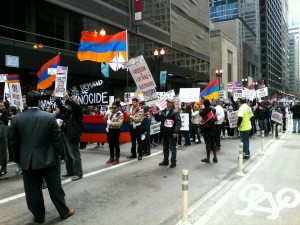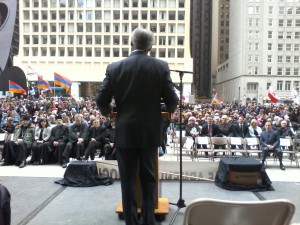Armenian Genocide Commemoration fills Daley Plaza
Gregory Harutunian — May 11, 2015
Armenian Genocide Commemoration rally marchers head toward the Turkish Consulate near Michigan Avenue. Photo by Greg Harutunian/for Chronicle Media
The wind swept and swirled in Chicago’s Daley Plaza, reminiscent of the lonely airs echoing through the valleys and mountain foothills of Armenia’s landscape, a homeland with its diaspora scattered around the globe.
The April 24 commemoration of the 100th anniversary of the Armenian Genocide brought nearly 2,000 people into the plaza, many being family and church members with relatives lost among the 1.5 million victims of forced marches and systematic slaughter by Turkish forces, during the 1915-16 period of World War I.
Largely considered as the first genocide of the 20th century, by historians and many world governments, it still remains unacknowledged by the Turkish government. Some plaza onlookers, attracted by flags and buoyed by commotion with speeches, merely stopped to listen and learn what it was about.
In early April, Pope Francis identified it as genocide in marking the 100th anniversary, and called upon the world to concur with him, which caused the Turkish ambassador to walk out during the address.
This week of remembrances began with Pres. Barack Obama signaling that he would not use the word, “genocide,” in his commemoration address. As a presidential candidate, he had pledged to use the word in calling for acknowledgement. The promise was later reneged upon in deference to Turkey being supplied with large funding allocations in permitting American fly-over zones and armed forces bases to remain there.
This turnabout was not lost to other federal and state government officials speaking at the rally.
“It’s about time that the words ‘Armenian’ and ‘genocide’ were used in the same breath,” said U.S. Sen. Dick Durbin, D- IL. “This gathering is more than about history, it is about honesty, where we acknowledge, once and for all, that this was a genocide that sadly claimed the lives of 1½ million Armenians and many other innocent people.”
Those people included murdered Greek and Assyrian populations, and their descendants made their presence known through large groups in attendance, flags, and banners.
Rep. Danny Davis, (D-7th), also a speaker on the dais, was asked about his participation, and responded, “Why am I here? When I was in the (Chicago) city council, my best friend was another council member, George Hagopian, and the relationship continues with his sons and daughters. I honor his friendship with me.
“In a deeper sense, whether Armenian, African, Native American, Jewish, any nationality … it is about the quest for justice, the quest for freedom. That, too, is why I’m here.”

Former news anchor John Davis speaks to the crowd gathered on Chicago’s Daley Plaza, during the Apr. 24 Armenian Genocide Commemoration Rally. Photo by Greg Harutunian/for Chronicle Media
Former news anchor John Davis, presented the speakers, and said, “(U.S. Sen.) Mark Kirk also wanted desperately to be here, and is here in spirit. Because of 1915, we know what genocide looks like. As my grandfather said, ‘If it looks like a duck, sounds like a duck … it will never be mistaken for an eagle.’”
The two-hour program included addresses by U. S. Rep. Bob Dold, (R-10th), U.S. Rep. Mike Quigley, (D-5th), U. S. Rep. Dan Lipinski, (D-3rd), Fritzie Fritzshall, a holocaust survivor and president of the Illinois Holocaust Museum Board, Endy Zemenides of the Hellenic American Leadership Council, and Dr. Joseph V. Danavi, from the GISHRU Bridge To Assyria.
On an equally somber note, the shadow of the late Cardinal Francis George cast a pall over the day’s events, as he and the Catholic Archdiocese of Chicago have long supported the Armenian cause. His own memorial service April 23 was a decade’s bookend to the 90th Armenian Genocide observance in 2005. Slated for the keynote address, the death of Pope John Paul II forced a cancellation with his participation in the Rome election conclave.
After the rally concluded, a march to the Turkish Consulate stepped off, down Wacker Drive toward Michigan Avenue, nearly one mile away. Barricades, erected to separate Armenian protesters and Turkish supporters, left both sides shouting epithets at each other although the purpose of the march was clearly displayed, and undeniable.







